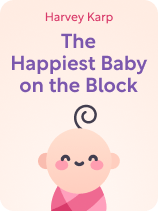

This article is an excerpt from the Shortform book guide to "The Happiest Baby on the Block" by Harvey Karp. Shortform has the world's best summaries and analyses of books you should be reading.
Like this article? Sign up for a free trial here.
How does poor sleep cause colic? What can you do to help your baby sleep better?
In The Happiest Baby on the Block, Harvey Karp notes that irregular or insufficient sleep can contribute to colic. He also provides advice for parents who want to improve their baby’s sleep.
Discover the connection between colic and sleep below.
How Poor Sleep Causes Colic
To explain the relationship between colic and sleep, Karp says that newborns tend to sleep between 14 and 18 hours a day, usually for two to four hours with an hour of time awake in between. While asleep, babies tend to cycle between lighter and deeper forms of sleep every hour—if something wakes them up during a deeper sleep cycle, they tend to have an easier time getting back to sleep. During a lighter cycle, though, a baby who has trouble self-soothing may start crying because they’re unable to get back to sleep.
(Shortform note: Pediatricians explain that part of the reason why babies sleep so erratically is because they can’t tell the difference between day and night. The circadian rhythm, or “internal clock” that determines how our bodies respond to light and darkness, doesn’t develop until around three to six months of age. This is why babies so often don’t cooperate with the sleep schedules of their caregivers—they don’t know any better. And much like adults, babies are worse at emotional regulation while tired, meaning poor and disjointed sleep contributes to colic.)
Helping Your Baby Sleep Better
While soothing techniques—swaddling, holding on the side/stomach, shushing, swinging, and sucking—are often enough to help your baby sleep, Karp offers several additional tips for helping your baby get better, longer stretches of sleep:
- Feed your baby at the right time: You can help your baby sleep for longer stretches by ensuring they aren’t hungry at night. If your baby still seems hungry after their last meal before sleeping, feel free to feed them a bit more. You can also wake them up between 10 PM and midnight for a feeding to help them sleep through more of the night.
- Plan your baby’s naps: To help your baby sleep better, make sure to wake them up after they’ve napped for two hours—this ensures they’re awake for their next feeding cycle and will eat enough throughout the day. However, don’t let them stay awake too long during the day either. Otherwise, they’ll get used to only falling asleep when overtired. This will prevent them from learning how to sleep when they’re less exhausted.
- Help your baby learn to self-soothe: After you put your sleeping baby in their crib, wake them up for a few seconds by jostling them or scratching the bottom of their feet. This will help them learn how to get back to sleep by making them practice it regularly.

———End of Preview———
Like what you just read? Read the rest of the world's best book summary and analysis of Harvey Karp's "The Happiest Baby on the Block" at Shortform.
Here's what you'll find in our full The Happiest Baby on the Block summary:
- A helpful guide for parents who have babies with colic
- A theory about why babies develop colic, and how to manage it
- How to improve your baby's sleep cycles (and thus your own)






